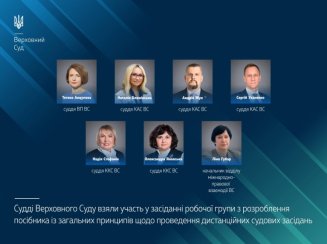Contact center of the Ukrainian Judiciary 044 207-35-46

The working group that developed the guidelines on general principles of remote court hearings in civil, administrative and criminal proceedings held its last meeting. The meeting was organized jointly by the Council of Europe project "Support for judicial institutions and processes to strengthen access to justice in Ukraine" and the European Commission for the Efficiency of Justice (CEPEJ).
The meeting was attended by the judge of the Grand Chamber of the Supreme Court Tetiana Antsupova, judges of the Administrative Cassation Court within the Supreme Court Nataliia Blazhivska, Andrii Zhuk, Serhii Ukhanenko, judges of the Criminal Cassation Court within the Supreme Court Nadiia Stefaniv, Oleksandra Yanovska and Head of the Division of International and Legal Cooperation of the Supreme Court Lina Hubar.
The general principles guidelines were developed by CEPEJ experts: Professor of Law and Attorney Marek Świerczyński (Poland), Associate Professor of the Catholic University of Lyon Law School Alexandre Palanco (France), who are also co-authors of the CEPEJ Guidelines on Videoconferencing in Judicial Proceedings, and IT Manager, Director of the Office for Technology Coordination of the Ministry of Justice of Italy (2016-2020) Giulio Borsari. The meeting was moderated by CEPEJ Project Coordinator Jovana Matić.
During the online meeting, the CEPEJ experts briefly outlined the main updates made since the previous meeting held in November. These updates are based on the recommendations, comments and suggestions of the members of the working group, which includes judges of the Supreme Court.
Marek Świerczyński thanked his Ukrainian colleagues for their constructive comments and suggestions on the text of the Guidelines - they helped to finalize the document. The amendments were aimed at improving the presentation of the text, word order and adaptation of the rules to Ukrainian practice.
In particular, the purpose and scope of the Guidelines were clarified. Their purpose is to introduce effective mechanisms for remote court hearings, the implementation of judicial proceedings in martial law and state of emergency. The Guidelines do not set binding legal standards, but provide recommendations and best practices that courts may apply at their discretion.
Also, according to the expert, the Guidelines include the following best practices: the Italian system of videoconferencing in criminal cases and the Polish system of videoconferencing in civil proceedings.
Nataliia Blazhivska noted that the Guidelines on the general principles of remote court hearings were very important for the judges of Ukraine.
The judge gave an example. In accordance with the provisions of the Code of Administrative Procedure of Ukraine, the risks of technical impossibility to participate in a videoconference outside the court premises, interruption of communication, etc. shall be borne by the participant of the case who filed the relevant application. Thus, if such a participant in the case disappears from the virtual courtroom, according to the procedure, the court may continue the hearing. However, according to Nataliia Blazhivska, in the current situation, depending on the circumstances of a particular case, the court may also adjourn the hearing so that the party can find another opportunity to join again. Actually, there are already many examples of such an approach in practice: in one case, the party was offered to find the nearest place with electricity and Internet, so the meeting continued in an hour.
"We must clearly understand that strict compliance with the procedure may not always be the best way out in today's Ukrainian reality, because the presence or absence of electricity does not actually depend on the will or desire of the party. Even courts face situations of prolonged absence of power supply or stable communication. Therefore, when applying procedural legislation in this difficult period, judges need to be more flexible, because this version of Article 195 of the Code of Administrative Procedure of Ukraine was adopted by the Verkhovna Rada of Ukraine in peaceful conditions," Nataliia Blazhivska is convinced.
The speaker also proposed to present this guide and its main ideas to the people's deputies of Ukraine to emphasize the importance of expanding the institution of remote justice under martial law. This may convince them to support the relevant amendments to the legislation.
Jovana Matić agreed with the expediency of such a meeting with the deputies and reminded that CEPEJ experts continued to work on the preparation of comments to the draft law developed with the participation of Supreme Court judges, which expands opportunities for online justice.
In conclusion, Jovana Matić thanked the Supreme Court for requesting CEPEJ and its experts to support remote justice in Ukraine, especially under martial law, and expressed her gratitude to the members of the working group for their time and valuable comments in the process of developing the guide.